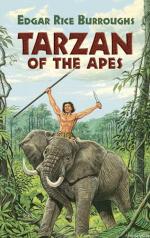|
This section contains 140 words (approx. 1 page at 300 words per page) |

|
Politically, Burroughs's views reflected the conservative ideas of his time. He distrusted communism, and his early villains were often Russians (ironically, his books later became extremely popular in the Soviet Union). In the 1930s, his extreme anti-German sentiments hurt his foreign sales, and Burroughs attempted to tone down his consistent use of foreign villains. As he grew older, Burroughs came to emphasize the brutality and waste of war for war's sake, deploring this instance of "civilized" man's inhumanity to his fellows. In Tarzan of the Apes, Burroughs comments that the ape-man "killed for food most often, but, being a man, he sometimes killed for pleasure, a thing which no other animal does; for it has remained for man alone among all creatures to kill senselessly and wantonly for the mere pleasure of inflicting suffering and death."
|
This section contains 140 words (approx. 1 page at 300 words per page) |

|




